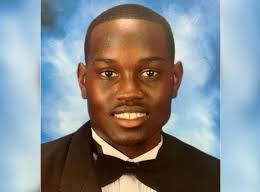Three white men were found guilty Wednesday of felony murder in the shooting death of Ahmaud Arbery, a Black man who was running in their neighborhood when the defendants confronted him last year.
The nearly all-white jury convicted Travis McMichael of malice murder, felony murder, aggravated assault, false imprisonment and criminal attempt to commit a felony.
Gregory McMichael and William Bryan were acquitted of the top charge. All now face up to life in prison.
The McMichaels and Bryan chased Arbery in pickup trucks after they spotted him in their neighborhood outside Brunswick, Georgia on Feb. 23, 2020. Travis McMichael shot Arbery, 25, who was Black, with a shotgun at close range. Bryan filmed the fatal encounter on his cellphone.
The three men, who are white, were arrested months later after the leaked video brought the world’s attention to the case.
Arbery’s family and civil rights leaders have likened his death to a modern-day lynching.
The defense had argued that the men suspected Arbery was a burglar and that residents in the Satilla Shores subdivision were “on edge.” Arbery was recorded on security camera video visiting a partially built home in the neighborhood several times. The videos did not show Arbery taking anything from the property. The last video was recorded the afternoon he died. Arbery could be seen visiting the home minutes before he was chased by Gregory and Travis McMichael and Bryan, who had separate defense teams.
The defense had sought to convince the jury that their clients were trying to execute a citizen’s arrest, which was legal at the time. Travis McMichael’s attorneys have said he opened fire in self-defense.
In her closing argument, lead prosecutor Linda Dunikoski told the jury that the defendants made a series of “assumptions and driveway decisions” that led to Arbery’s death and that the three men had no “immediate knowledge” that a crime had occurred. She said immediate knowledge of a crime is necessary to claim citizen’s arrest. Without the claim of citizen’s arrest, Dunikoski told the jurors during closing, the men cannot claim that they acted in self-defense.
“If you determine that this was not a citizen’s arrest, this was not legitimate, he had no probable cause, he can’t do this based on the law, then guess what?” Dunikoski said. “They’re not justified in killing him. They are not justified in any of the felonies they committed against him.”
During the trial, Travis McMichael testified that he shot Arbery after he was “struck.”
“We were face to face. And being struck, that’s when I shot,” he testified. McMichael said he believed he was in “a life-or-death situation.”
Under cross-examination by Dunikoski on his second day of testimony, Travis McMichael said that Arbery hadn’t shown a weapon or spoken to him at all before McMichael raised his shotgun. Gregory McMichael and Bryan did not testify.
